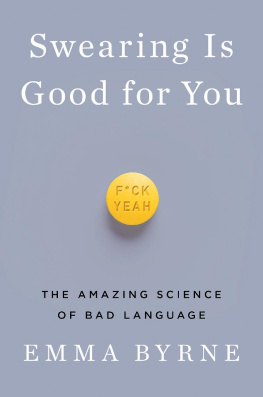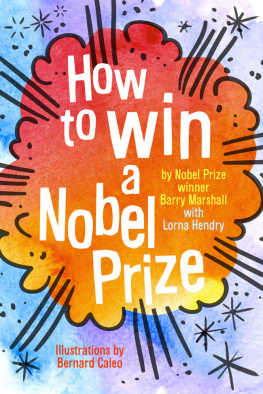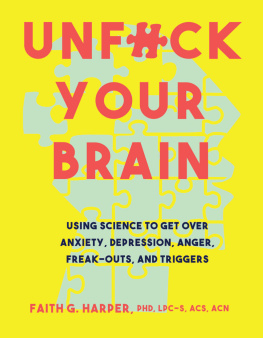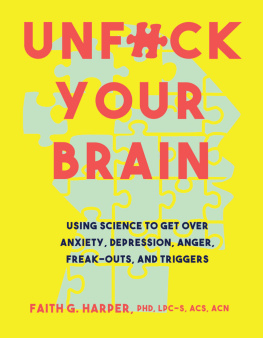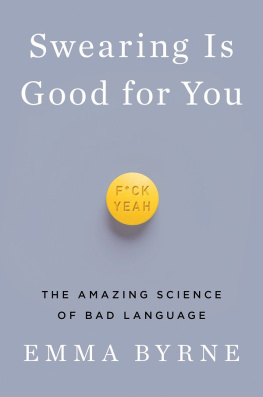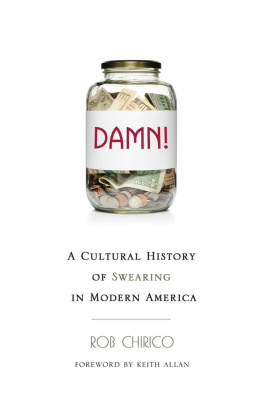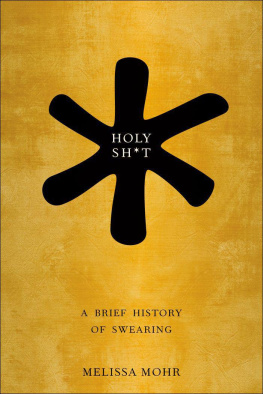
To Team Science Baby, with love and gratitude.
CONTENTS
Swearing draws upon such powerful and incongruous resonators as religion, sex, madness, excretion, and nationality, encompassing an extraordinary variety of attitudes including the violent, the amusing, the shocking, the absurd, the casual and the impossible.
Geoffrey Hughes
When I was about nine years old, I was smacked for calling my little brother a twat. I had no idea what a twat wasI thought it was just a silly way of saying twitbut that smack taught me that some words are more powerful than others and that I had to be careful how I used them.
But, as youve no doubt gathered, that experience didnt exactly cure me of swearing. In fact, it probably went some way toward piquing my fascination with profanity. Since then Ive had a certain pride in my knack for colorful and well-timed swearing: being a woman in a male-dominated field, I rely on it to camouflage myself as one of the guys. Calling some equipment a fucking piece of shit is often a necessary rite of passage when I join a new team.
So when I discovered that other scientists have been taking swearing seriously for a long timeand that Im not the only person who finds judicious profanity usefulI was fucking delighted! I first began to realize there was more to swearing than a bit of banter or blasphemy when I happened to read a study that involved sixty-seven brave volunteers, a bucket of ice water, a swear word, and a stopwatch. I was working in a neuroscience lab at the time, and that study changed the course of my research. It set me on a quest to study swearing: why we do it, how we do it, and what it tells us about ourselves.
But what is swearing and why is it special? Is it the way that it sounds? Or the way that it feels when we say it? Does every language have swearing? Why do we try to teach our children not to swear but always end up having to tell them not to swear? Thanks to a whole range of scientists from Victorian surgeons to modern neuroscientists, we know a lot more about swearing than we used to. But, because swearing is still seen as shocking (there was much agonizing about the wisdom or otherwise of using a swear word in the title of this book), that information hasnt made it into the mainstream. Its a fucking shame that the fascinating facts about swearing are still largely locked up in journals and textbooks.
For example, Im definitely not the only person who uses swearing as a way of fitting in at work. On the contrary, research shows that swearing can help build teams in the workplace. From the factory floor to the operating room, scientists have shown that teams who share a vulgar lexicon tend to work more effectively together, feel closer, and be more productive than those who dont. These same studies show that managing stress in the same way that we manage painwith a fucking good swearis more effective than any number of team building exercises.
Swearing has also helped to develop the field of neuroscience. By providing us with a useful emotional barometer, swearing has been used as a research tool for over 150 years. It has helped us to discover some fascinating things about the structure of the human brain, such as its division into left and right hemispheres, and the role of cerebral structures like the amygdala in the regulation of emotions.
Swearing has taught us a great deal about our minds, too. We know that people who learn a second language often find it less stressful to swear in their adopted tongue, which gives us an idea of the childhood developmental stages at which we learn emotions and taboos. Swearing also makes the heart beat faster and primes us to think aggressive thoughts while, paradoxically, making us less likely to be physically violent.
And swearing is a surprisingly flexible part of our linguistic repertoire. It reinvents itself from generation to generation as taboos shift. Profanity has even become part of the way we express positive feelingswe know that soccer fans use fuck just as frequently when theyre happy as when they are angry or frustrated.
That last finding is one of my own. With colleagues at City University, London, Ive studied thousands of soccer fans and their bad language during big games. Its no great surprise that soccer fans swear, and that they are particularly fond of fuck and shit. But we noticed something interesting about the ratio between these two swear words. The fuckshit ratio is a reliable indicator of which team has scored because it turns out that shit is almost universally negative while fuck can be a sign of something good or bad. Swearing among football fans also isnt anywhere near as aggressive as you might think; fans on Twitter almost never swear about their opponents and reserve their outbursts for players on their own team.
Publishing that research gave me an insight into the sort of public disapproval that swearing still attracts. We were contacted by a journalist from one of the UKs most widely read newspapers. I wont name it, but its well known for its thunderously moralizing tone while at the same time printing long-lens photographs of women who are then accused of flaunting some part of their bodies. We were asked (a) how much money had been spent (wasted) on the research and (b) whether we wouldnt be better doing something useful (like curing cancer). I replied that the entire cost of the researchthe 6.99 spent on a bottle of wine while we came up with the hypothesishad been self-funded, and that my coauthor and I were computer scientists with very limited understanding of oncology, so it was probably best if we stayed away from interfering with anyone suffering from cancer. We didnt hear back. But this exchange brought home the fact that swearing is still a long way from being a respectable topic of research.
Swearing is one of those things that comes so naturally, and seems so frivolous, that you might be surprised by the number of scientists who are studying it. But neuroscientists, psychologists, sociologists, and historians have long taken an interest in bad language, and for good reason. Although swearing might seem frivolous, it teaches us a lot about how our brains, our minds, and even our societies work.
This book wont just look at swearing in isolation. One of the things that makes swearing so fucking amazing is the sheer breadth of connections it has with our lives. Throughout this book Ill cover many different topics, some of which might seem like digressions. There are plenty of pages that contain no profanity whatsoever but, from the indirectness of Japanese speech patterns to the unintended consequences of potty training chimpanzees, everything relates back to the way we use bad language.
Is this book simply an attempt to justify rudeness and aggression? Not at all. I certainly wouldnt want profanities to become commonplace: swearing needs to maintain its emotional impact in order to be effective. We only need to look at the way that swearing has changed over the last hundred years to see that, as some swear words become mild and ineffectual through overuse or shifting cultural values, we reach for other taboos to fill the gap. Where blasphemy was once the true obscenity, the modern unsayables include racist and sexist terms as swear words. Depending on your point of view this is either a lamentable shift toward political correctness or timely recognition that bigotry is ugly and damaging.
What Is Swearing?
Historically, bad language consisted of swearing, oaths, and curses. Thats because such utterances were considered to have a particular type of word magic. The power of an oath, a pledge, or a curse was potentially enough to call down calamities or literally change the world.
Next page
